NSB305: GRN Challenges and Conflict Resolution Strategies
VerifiedAdded on 2022/09/09
|7
|1968
|15
Essay
AI Summary
This essay, prepared as a supplementary assessment for the NSB305 course, examines the challenges faced by Graduate Registered Nurses (GRNs) during their transition into practice. The paper identifies two key intra-professional challenges: bullying from experienced nurses and lack of sufficient support from colleagues. It then delves into strategies to mitigate these issues, focusing on the importance of self-awareness and effective communication techniques. The essay emphasizes how self-awareness enables nurses to understand their strengths and weaknesses, fostering better working relationships and preventing conflicts. Furthermore, it highlights various communication methods, such as using professional language, clarifying information, active listening, and respecting differences, as crucial tools for resolving conflicts and promoting a positive work environment. The paper concludes by reiterating the significance of these strategies in navigating the difficulties of a new nursing career and ensuring optimal patient care.
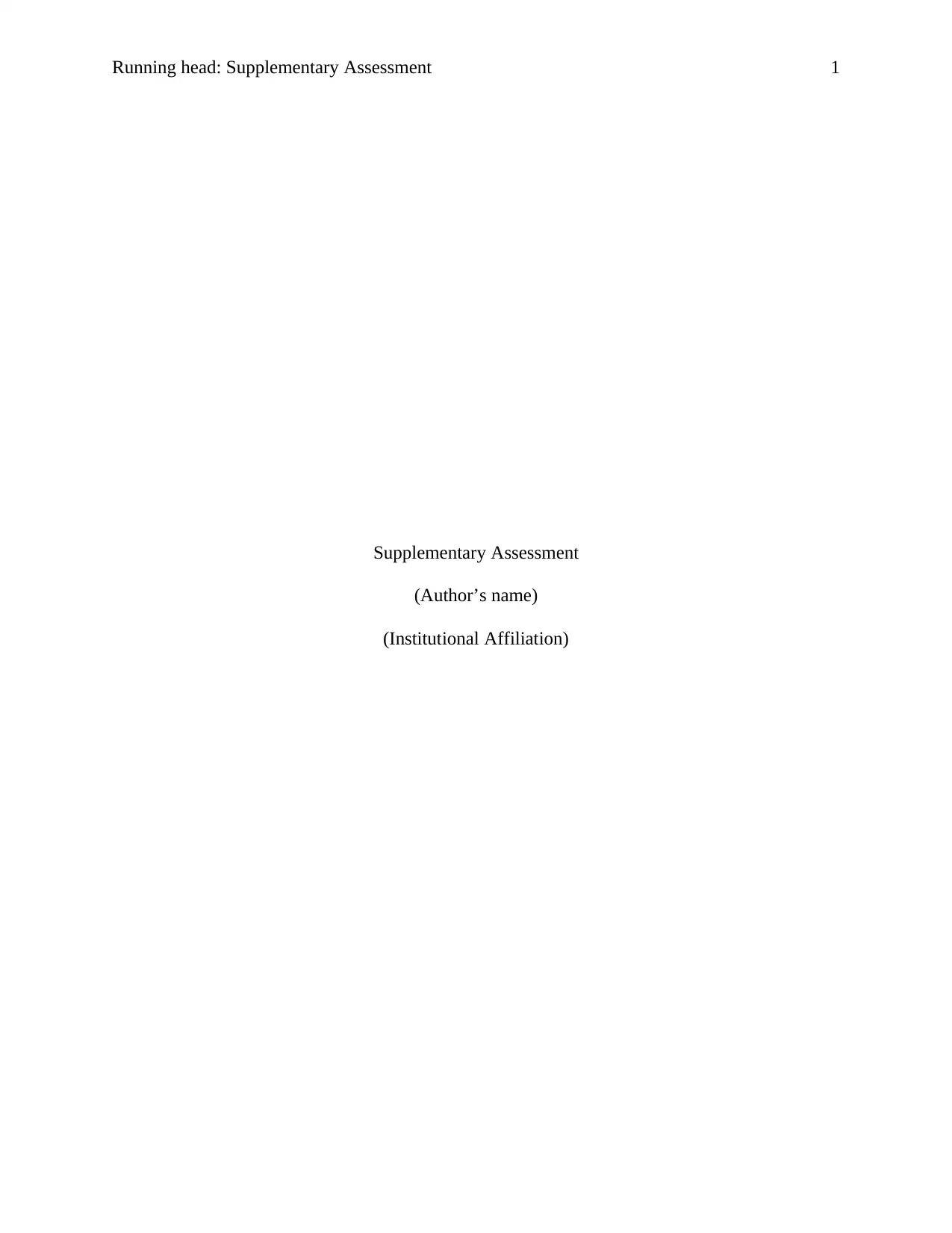
Running head: Supplementary Assessment 1
Supplementary Assessment
(Author’s name)
(Institutional Affiliation)
Supplementary Assessment
(Author’s name)
(Institutional Affiliation)
Paraphrase This Document
Need a fresh take? Get an instant paraphrase of this document with our AI Paraphraser
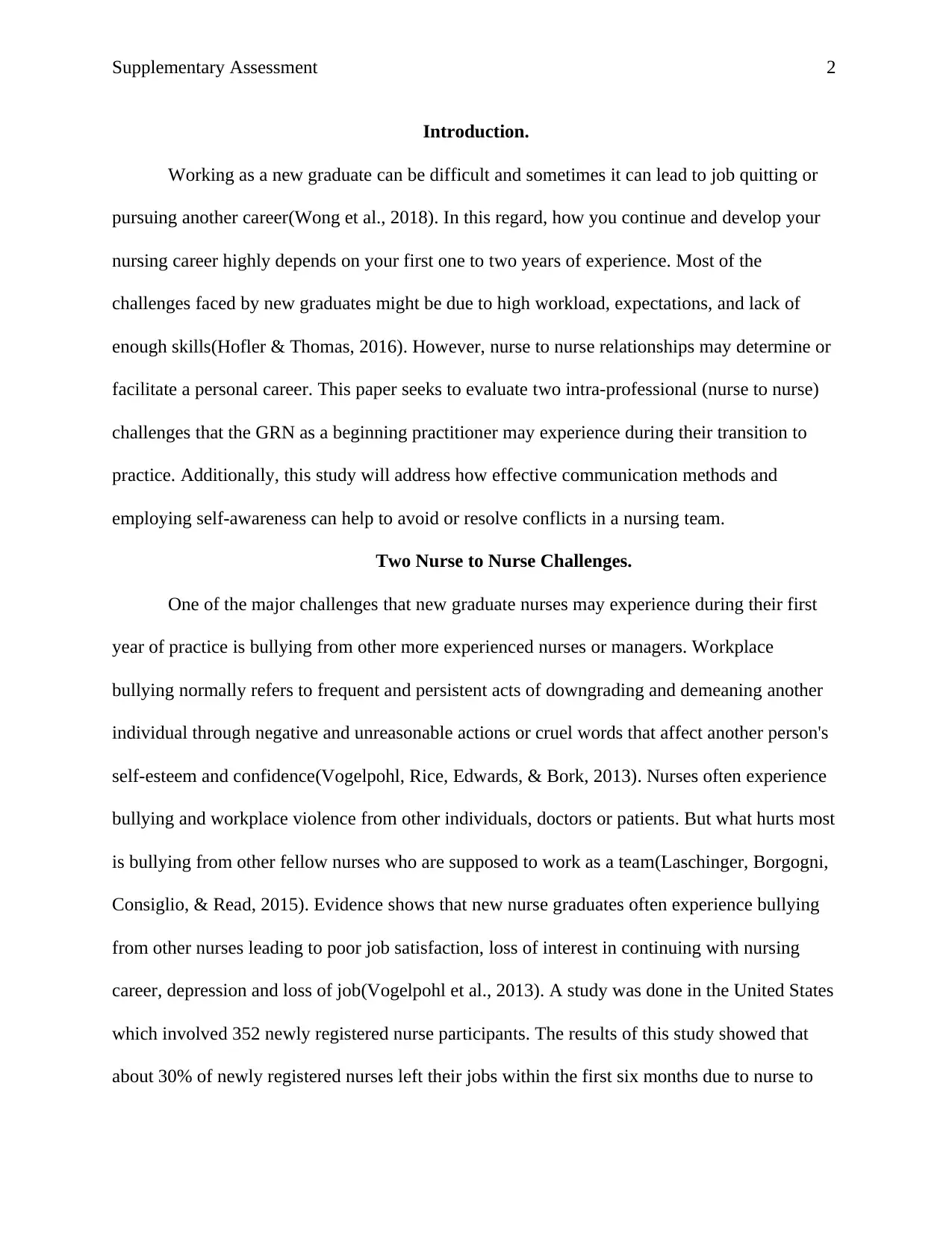
Supplementary Assessment 2
Introduction.
Working as a new graduate can be difficult and sometimes it can lead to job quitting or
pursuing another career(Wong et al., 2018). In this regard, how you continue and develop your
nursing career highly depends on your first one to two years of experience. Most of the
challenges faced by new graduates might be due to high workload, expectations, and lack of
enough skills(Hofler & Thomas, 2016). However, nurse to nurse relationships may determine or
facilitate a personal career. This paper seeks to evaluate two intra-professional (nurse to nurse)
challenges that the GRN as a beginning practitioner may experience during their transition to
practice. Additionally, this study will address how effective communication methods and
employing self-awareness can help to avoid or resolve conflicts in a nursing team.
Two Nurse to Nurse Challenges.
One of the major challenges that new graduate nurses may experience during their first
year of practice is bullying from other more experienced nurses or managers. Workplace
bullying normally refers to frequent and persistent acts of downgrading and demeaning another
individual through negative and unreasonable actions or cruel words that affect another person's
self-esteem and confidence(Vogelpohl, Rice, Edwards, & Bork, 2013). Nurses often experience
bullying and workplace violence from other individuals, doctors or patients. But what hurts most
is bullying from other fellow nurses who are supposed to work as a team(Laschinger, Borgogni,
Consiglio, & Read, 2015). Evidence shows that new nurse graduates often experience bullying
from other nurses leading to poor job satisfaction, loss of interest in continuing with nursing
career, depression and loss of job(Vogelpohl et al., 2013). A study was done in the United States
which involved 352 newly registered nurse participants. The results of this study showed that
about 30% of newly registered nurses left their jobs within the first six months due to nurse to
Introduction.
Working as a new graduate can be difficult and sometimes it can lead to job quitting or
pursuing another career(Wong et al., 2018). In this regard, how you continue and develop your
nursing career highly depends on your first one to two years of experience. Most of the
challenges faced by new graduates might be due to high workload, expectations, and lack of
enough skills(Hofler & Thomas, 2016). However, nurse to nurse relationships may determine or
facilitate a personal career. This paper seeks to evaluate two intra-professional (nurse to nurse)
challenges that the GRN as a beginning practitioner may experience during their transition to
practice. Additionally, this study will address how effective communication methods and
employing self-awareness can help to avoid or resolve conflicts in a nursing team.
Two Nurse to Nurse Challenges.
One of the major challenges that new graduate nurses may experience during their first
year of practice is bullying from other more experienced nurses or managers. Workplace
bullying normally refers to frequent and persistent acts of downgrading and demeaning another
individual through negative and unreasonable actions or cruel words that affect another person's
self-esteem and confidence(Vogelpohl, Rice, Edwards, & Bork, 2013). Nurses often experience
bullying and workplace violence from other individuals, doctors or patients. But what hurts most
is bullying from other fellow nurses who are supposed to work as a team(Laschinger, Borgogni,
Consiglio, & Read, 2015). Evidence shows that new nurse graduates often experience bullying
from other nurses leading to poor job satisfaction, loss of interest in continuing with nursing
career, depression and loss of job(Vogelpohl et al., 2013). A study was done in the United States
which involved 352 newly registered nurse participants. The results of this study showed that
about 30% of newly registered nurses left their jobs within the first six months due to nurse to
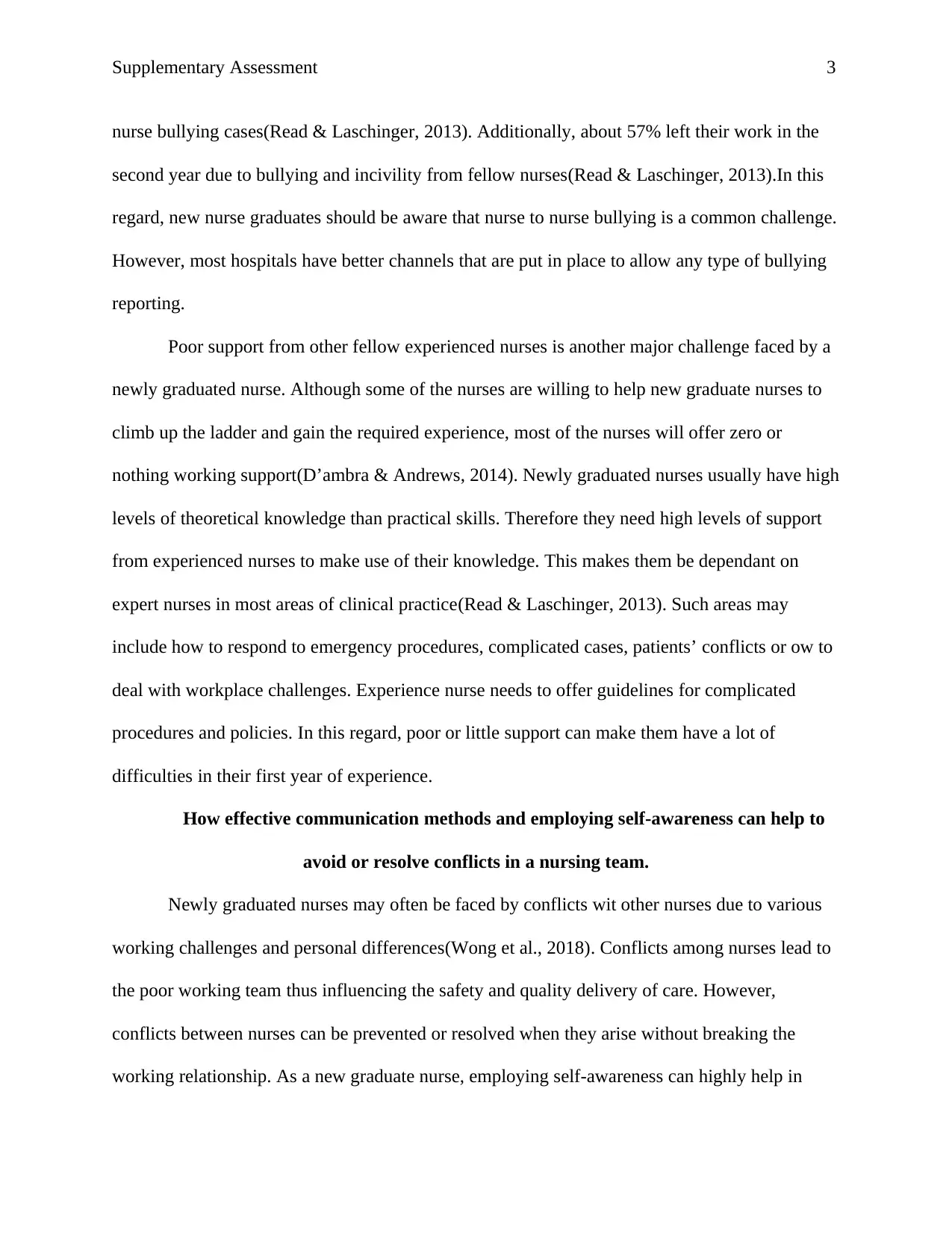
Supplementary Assessment 3
nurse bullying cases(Read & Laschinger, 2013). Additionally, about 57% left their work in the
second year due to bullying and incivility from fellow nurses(Read & Laschinger, 2013).In this
regard, new nurse graduates should be aware that nurse to nurse bullying is a common challenge.
However, most hospitals have better channels that are put in place to allow any type of bullying
reporting.
Poor support from other fellow experienced nurses is another major challenge faced by a
newly graduated nurse. Although some of the nurses are willing to help new graduate nurses to
climb up the ladder and gain the required experience, most of the nurses will offer zero or
nothing working support(D’ambra & Andrews, 2014). Newly graduated nurses usually have high
levels of theoretical knowledge than practical skills. Therefore they need high levels of support
from experienced nurses to make use of their knowledge. This makes them be dependant on
expert nurses in most areas of clinical practice(Read & Laschinger, 2013). Such areas may
include how to respond to emergency procedures, complicated cases, patients’ conflicts or ow to
deal with workplace challenges. Experience nurse needs to offer guidelines for complicated
procedures and policies. In this regard, poor or little support can make them have a lot of
difficulties in their first year of experience.
How effective communication methods and employing self-awareness can help to
avoid or resolve conflicts in a nursing team.
Newly graduated nurses may often be faced by conflicts wit other nurses due to various
working challenges and personal differences(Wong et al., 2018). Conflicts among nurses lead to
the poor working team thus influencing the safety and quality delivery of care. However,
conflicts between nurses can be prevented or resolved when they arise without breaking the
working relationship. As a new graduate nurse, employing self-awareness can highly help in
nurse bullying cases(Read & Laschinger, 2013). Additionally, about 57% left their work in the
second year due to bullying and incivility from fellow nurses(Read & Laschinger, 2013).In this
regard, new nurse graduates should be aware that nurse to nurse bullying is a common challenge.
However, most hospitals have better channels that are put in place to allow any type of bullying
reporting.
Poor support from other fellow experienced nurses is another major challenge faced by a
newly graduated nurse. Although some of the nurses are willing to help new graduate nurses to
climb up the ladder and gain the required experience, most of the nurses will offer zero or
nothing working support(D’ambra & Andrews, 2014). Newly graduated nurses usually have high
levels of theoretical knowledge than practical skills. Therefore they need high levels of support
from experienced nurses to make use of their knowledge. This makes them be dependant on
expert nurses in most areas of clinical practice(Read & Laschinger, 2013). Such areas may
include how to respond to emergency procedures, complicated cases, patients’ conflicts or ow to
deal with workplace challenges. Experience nurse needs to offer guidelines for complicated
procedures and policies. In this regard, poor or little support can make them have a lot of
difficulties in their first year of experience.
How effective communication methods and employing self-awareness can help to
avoid or resolve conflicts in a nursing team.
Newly graduated nurses may often be faced by conflicts wit other nurses due to various
working challenges and personal differences(Wong et al., 2018). Conflicts among nurses lead to
the poor working team thus influencing the safety and quality delivery of care. However,
conflicts between nurses can be prevented or resolved when they arise without breaking the
working relationship. As a new graduate nurse, employing self-awareness can highly help in
⊘ This is a preview!⊘
Do you want full access?
Subscribe today to unlock all pages.

Trusted by 1+ million students worldwide
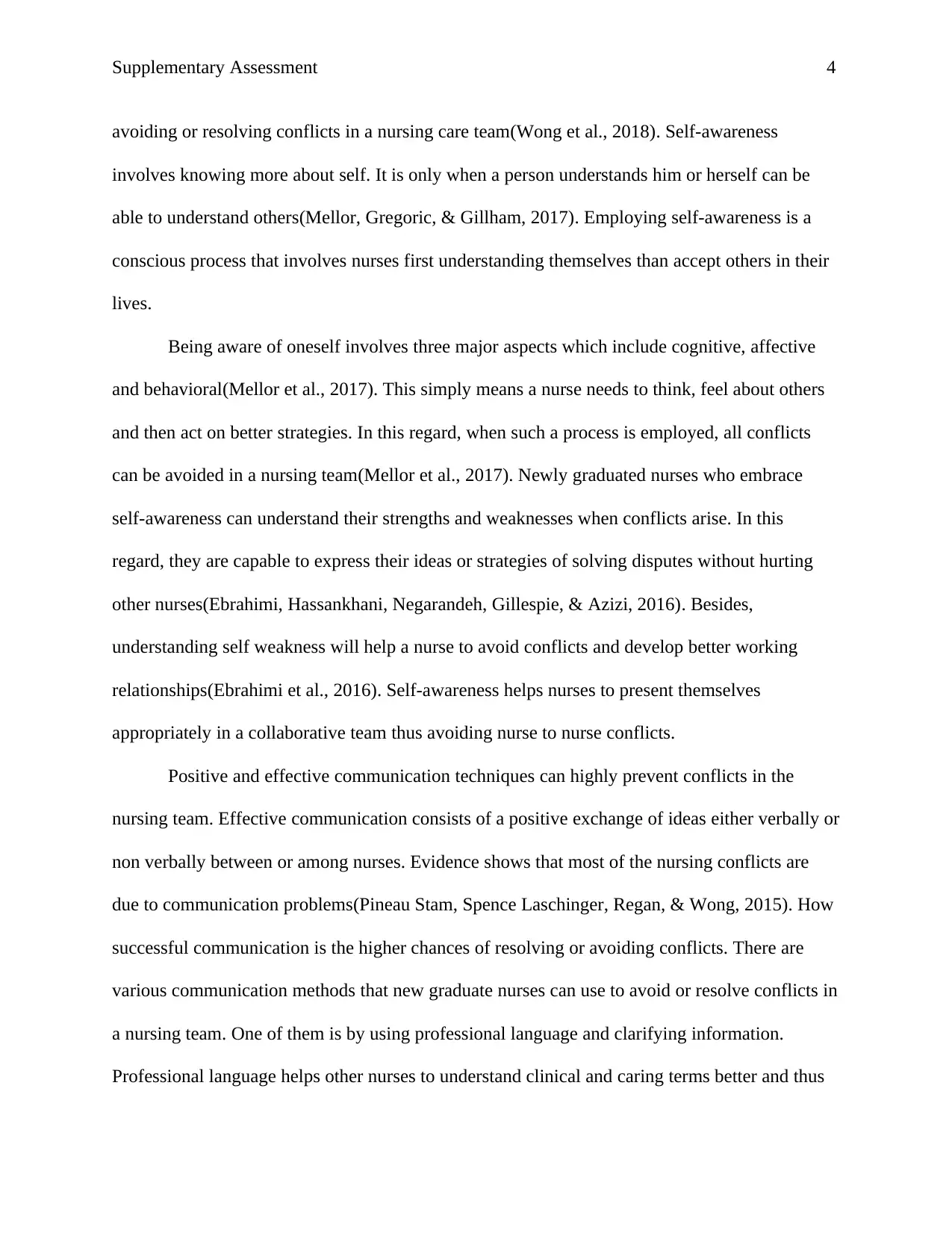
Supplementary Assessment 4
avoiding or resolving conflicts in a nursing care team(Wong et al., 2018). Self-awareness
involves knowing more about self. It is only when a person understands him or herself can be
able to understand others(Mellor, Gregoric, & Gillham, 2017). Employing self-awareness is a
conscious process that involves nurses first understanding themselves than accept others in their
lives.
Being aware of oneself involves three major aspects which include cognitive, affective
and behavioral(Mellor et al., 2017). This simply means a nurse needs to think, feel about others
and then act on better strategies. In this regard, when such a process is employed, all conflicts
can be avoided in a nursing team(Mellor et al., 2017). Newly graduated nurses who embrace
self-awareness can understand their strengths and weaknesses when conflicts arise. In this
regard, they are capable to express their ideas or strategies of solving disputes without hurting
other nurses(Ebrahimi, Hassankhani, Negarandeh, Gillespie, & Azizi, 2016). Besides,
understanding self weakness will help a nurse to avoid conflicts and develop better working
relationships(Ebrahimi et al., 2016). Self-awareness helps nurses to present themselves
appropriately in a collaborative team thus avoiding nurse to nurse conflicts.
Positive and effective communication techniques can highly prevent conflicts in the
nursing team. Effective communication consists of a positive exchange of ideas either verbally or
non verbally between or among nurses. Evidence shows that most of the nursing conflicts are
due to communication problems(Pineau Stam, Spence Laschinger, Regan, & Wong, 2015). How
successful communication is the higher chances of resolving or avoiding conflicts. There are
various communication methods that new graduate nurses can use to avoid or resolve conflicts in
a nursing team. One of them is by using professional language and clarifying information.
Professional language helps other nurses to understand clinical and caring terms better and thus
avoiding or resolving conflicts in a nursing care team(Wong et al., 2018). Self-awareness
involves knowing more about self. It is only when a person understands him or herself can be
able to understand others(Mellor, Gregoric, & Gillham, 2017). Employing self-awareness is a
conscious process that involves nurses first understanding themselves than accept others in their
lives.
Being aware of oneself involves three major aspects which include cognitive, affective
and behavioral(Mellor et al., 2017). This simply means a nurse needs to think, feel about others
and then act on better strategies. In this regard, when such a process is employed, all conflicts
can be avoided in a nursing team(Mellor et al., 2017). Newly graduated nurses who embrace
self-awareness can understand their strengths and weaknesses when conflicts arise. In this
regard, they are capable to express their ideas or strategies of solving disputes without hurting
other nurses(Ebrahimi, Hassankhani, Negarandeh, Gillespie, & Azizi, 2016). Besides,
understanding self weakness will help a nurse to avoid conflicts and develop better working
relationships(Ebrahimi et al., 2016). Self-awareness helps nurses to present themselves
appropriately in a collaborative team thus avoiding nurse to nurse conflicts.
Positive and effective communication techniques can highly prevent conflicts in the
nursing team. Effective communication consists of a positive exchange of ideas either verbally or
non verbally between or among nurses. Evidence shows that most of the nursing conflicts are
due to communication problems(Pineau Stam, Spence Laschinger, Regan, & Wong, 2015). How
successful communication is the higher chances of resolving or avoiding conflicts. There are
various communication methods that new graduate nurses can use to avoid or resolve conflicts in
a nursing team. One of them is by using professional language and clarifying information.
Professional language helps other nurses to understand clinical and caring terms better and thus
Paraphrase This Document
Need a fresh take? Get an instant paraphrase of this document with our AI Paraphraser
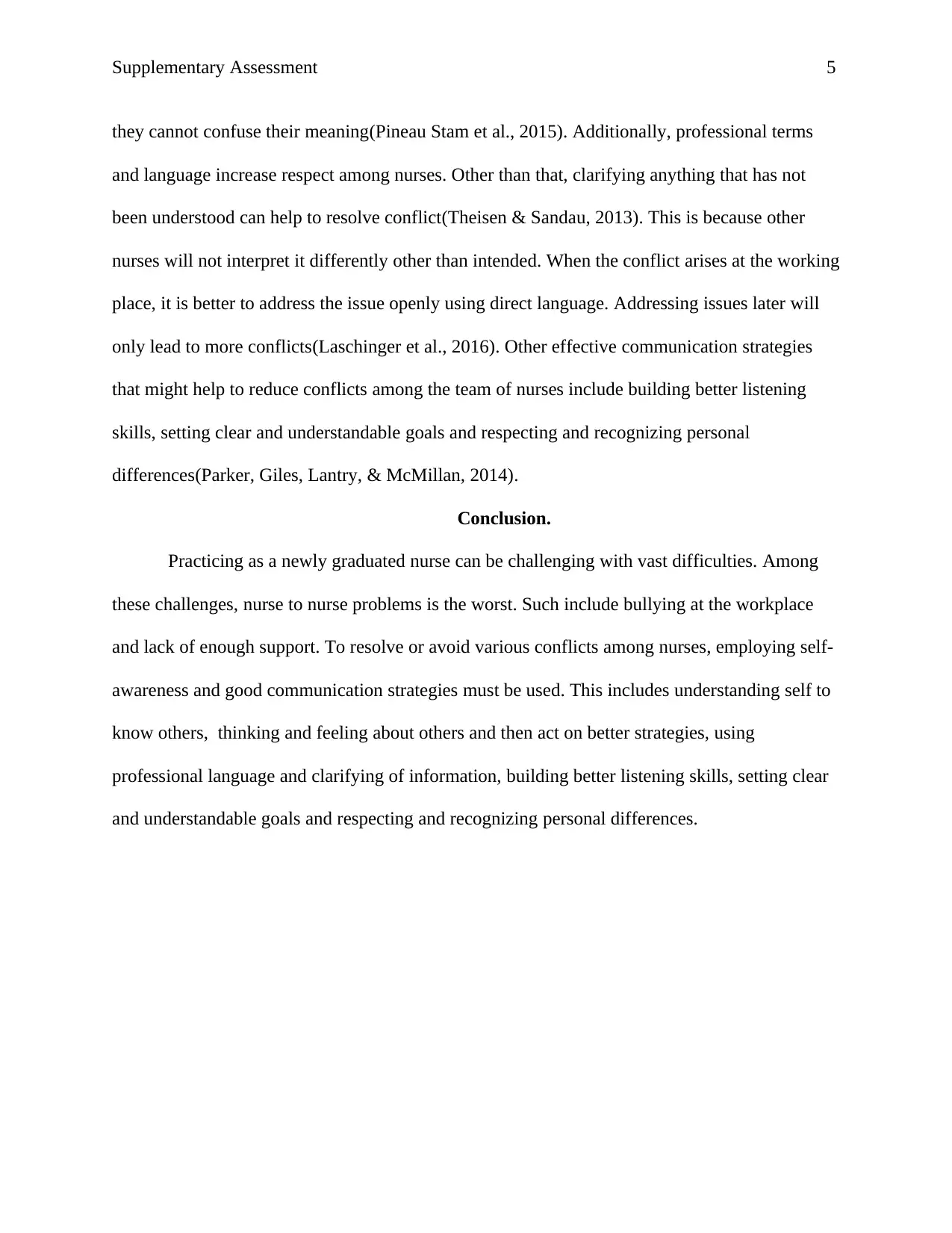
Supplementary Assessment 5
they cannot confuse their meaning(Pineau Stam et al., 2015). Additionally, professional terms
and language increase respect among nurses. Other than that, clarifying anything that has not
been understood can help to resolve conflict(Theisen & Sandau, 2013). This is because other
nurses will not interpret it differently other than intended. When the conflict arises at the working
place, it is better to address the issue openly using direct language. Addressing issues later will
only lead to more conflicts(Laschinger et al., 2016). Other effective communication strategies
that might help to reduce conflicts among the team of nurses include building better listening
skills, setting clear and understandable goals and respecting and recognizing personal
differences(Parker, Giles, Lantry, & McMillan, 2014).
Conclusion.
Practicing as a newly graduated nurse can be challenging with vast difficulties. Among
these challenges, nurse to nurse problems is the worst. Such include bullying at the workplace
and lack of enough support. To resolve or avoid various conflicts among nurses, employing self-
awareness and good communication strategies must be used. This includes understanding self to
know others, thinking and feeling about others and then act on better strategies, using
professional language and clarifying of information, building better listening skills, setting clear
and understandable goals and respecting and recognizing personal differences.
they cannot confuse their meaning(Pineau Stam et al., 2015). Additionally, professional terms
and language increase respect among nurses. Other than that, clarifying anything that has not
been understood can help to resolve conflict(Theisen & Sandau, 2013). This is because other
nurses will not interpret it differently other than intended. When the conflict arises at the working
place, it is better to address the issue openly using direct language. Addressing issues later will
only lead to more conflicts(Laschinger et al., 2016). Other effective communication strategies
that might help to reduce conflicts among the team of nurses include building better listening
skills, setting clear and understandable goals and respecting and recognizing personal
differences(Parker, Giles, Lantry, & McMillan, 2014).
Conclusion.
Practicing as a newly graduated nurse can be challenging with vast difficulties. Among
these challenges, nurse to nurse problems is the worst. Such include bullying at the workplace
and lack of enough support. To resolve or avoid various conflicts among nurses, employing self-
awareness and good communication strategies must be used. This includes understanding self to
know others, thinking and feeling about others and then act on better strategies, using
professional language and clarifying of information, building better listening skills, setting clear
and understandable goals and respecting and recognizing personal differences.
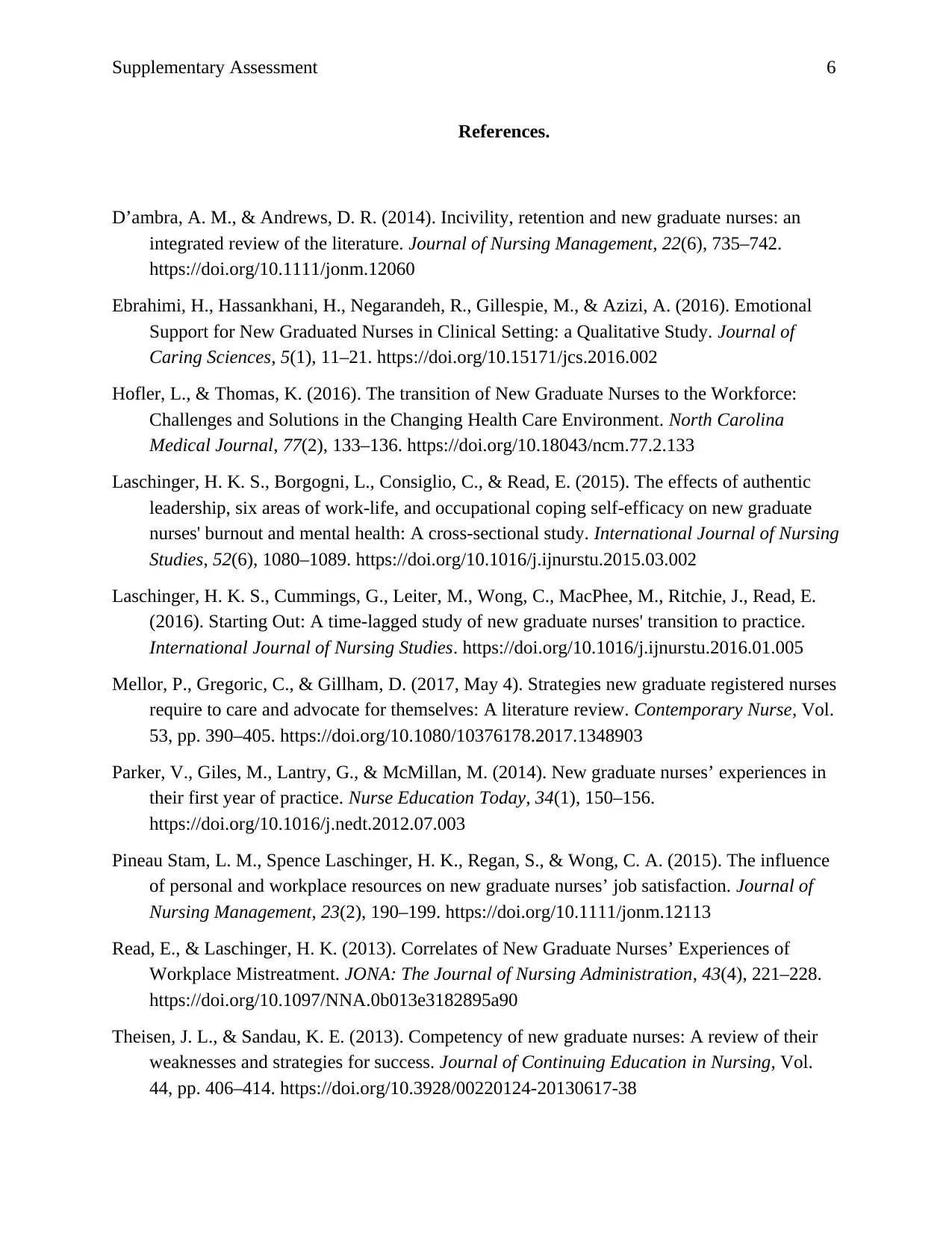
Supplementary Assessment 6
References.
D’ambra, A. M., & Andrews, D. R. (2014). Incivility, retention and new graduate nurses: an
integrated review of the literature. Journal of Nursing Management, 22(6), 735–742.
https://doi.org/10.1111/jonm.12060
Ebrahimi, H., Hassankhani, H., Negarandeh, R., Gillespie, M., & Azizi, A. (2016). Emotional
Support for New Graduated Nurses in Clinical Setting: a Qualitative Study. Journal of
Caring Sciences, 5(1), 11–21. https://doi.org/10.15171/jcs.2016.002
Hofler, L., & Thomas, K. (2016). The transition of New Graduate Nurses to the Workforce:
Challenges and Solutions in the Changing Health Care Environment. North Carolina
Medical Journal, 77(2), 133–136. https://doi.org/10.18043/ncm.77.2.133
Laschinger, H. K. S., Borgogni, L., Consiglio, C., & Read, E. (2015). The effects of authentic
leadership, six areas of work-life, and occupational coping self-efficacy on new graduate
nurses' burnout and mental health: A cross-sectional study. International Journal of Nursing
Studies, 52(6), 1080–1089. https://doi.org/10.1016/j.ijnurstu.2015.03.002
Laschinger, H. K. S., Cummings, G., Leiter, M., Wong, C., MacPhee, M., Ritchie, J., Read, E.
(2016). Starting Out: A time-lagged study of new graduate nurses' transition to practice.
International Journal of Nursing Studies. https://doi.org/10.1016/j.ijnurstu.2016.01.005
Mellor, P., Gregoric, C., & Gillham, D. (2017, May 4). Strategies new graduate registered nurses
require to care and advocate for themselves: A literature review. Contemporary Nurse, Vol.
53, pp. 390–405. https://doi.org/10.1080/10376178.2017.1348903
Parker, V., Giles, M., Lantry, G., & McMillan, M. (2014). New graduate nurses’ experiences in
their first year of practice. Nurse Education Today, 34(1), 150–156.
https://doi.org/10.1016/j.nedt.2012.07.003
Pineau Stam, L. M., Spence Laschinger, H. K., Regan, S., & Wong, C. A. (2015). The influence
of personal and workplace resources on new graduate nurses’ job satisfaction. Journal of
Nursing Management, 23(2), 190–199. https://doi.org/10.1111/jonm.12113
Read, E., & Laschinger, H. K. (2013). Correlates of New Graduate Nurses’ Experiences of
Workplace Mistreatment. JONA: The Journal of Nursing Administration, 43(4), 221–228.
https://doi.org/10.1097/NNA.0b013e3182895a90
Theisen, J. L., & Sandau, K. E. (2013). Competency of new graduate nurses: A review of their
weaknesses and strategies for success. Journal of Continuing Education in Nursing, Vol.
44, pp. 406–414. https://doi.org/10.3928/00220124-20130617-38
References.
D’ambra, A. M., & Andrews, D. R. (2014). Incivility, retention and new graduate nurses: an
integrated review of the literature. Journal of Nursing Management, 22(6), 735–742.
https://doi.org/10.1111/jonm.12060
Ebrahimi, H., Hassankhani, H., Negarandeh, R., Gillespie, M., & Azizi, A. (2016). Emotional
Support for New Graduated Nurses in Clinical Setting: a Qualitative Study. Journal of
Caring Sciences, 5(1), 11–21. https://doi.org/10.15171/jcs.2016.002
Hofler, L., & Thomas, K. (2016). The transition of New Graduate Nurses to the Workforce:
Challenges and Solutions in the Changing Health Care Environment. North Carolina
Medical Journal, 77(2), 133–136. https://doi.org/10.18043/ncm.77.2.133
Laschinger, H. K. S., Borgogni, L., Consiglio, C., & Read, E. (2015). The effects of authentic
leadership, six areas of work-life, and occupational coping self-efficacy on new graduate
nurses' burnout and mental health: A cross-sectional study. International Journal of Nursing
Studies, 52(6), 1080–1089. https://doi.org/10.1016/j.ijnurstu.2015.03.002
Laschinger, H. K. S., Cummings, G., Leiter, M., Wong, C., MacPhee, M., Ritchie, J., Read, E.
(2016). Starting Out: A time-lagged study of new graduate nurses' transition to practice.
International Journal of Nursing Studies. https://doi.org/10.1016/j.ijnurstu.2016.01.005
Mellor, P., Gregoric, C., & Gillham, D. (2017, May 4). Strategies new graduate registered nurses
require to care and advocate for themselves: A literature review. Contemporary Nurse, Vol.
53, pp. 390–405. https://doi.org/10.1080/10376178.2017.1348903
Parker, V., Giles, M., Lantry, G., & McMillan, M. (2014). New graduate nurses’ experiences in
their first year of practice. Nurse Education Today, 34(1), 150–156.
https://doi.org/10.1016/j.nedt.2012.07.003
Pineau Stam, L. M., Spence Laschinger, H. K., Regan, S., & Wong, C. A. (2015). The influence
of personal and workplace resources on new graduate nurses’ job satisfaction. Journal of
Nursing Management, 23(2), 190–199. https://doi.org/10.1111/jonm.12113
Read, E., & Laschinger, H. K. (2013). Correlates of New Graduate Nurses’ Experiences of
Workplace Mistreatment. JONA: The Journal of Nursing Administration, 43(4), 221–228.
https://doi.org/10.1097/NNA.0b013e3182895a90
Theisen, J. L., & Sandau, K. E. (2013). Competency of new graduate nurses: A review of their
weaknesses and strategies for success. Journal of Continuing Education in Nursing, Vol.
44, pp. 406–414. https://doi.org/10.3928/00220124-20130617-38
⊘ This is a preview!⊘
Do you want full access?
Subscribe today to unlock all pages.

Trusted by 1+ million students worldwide
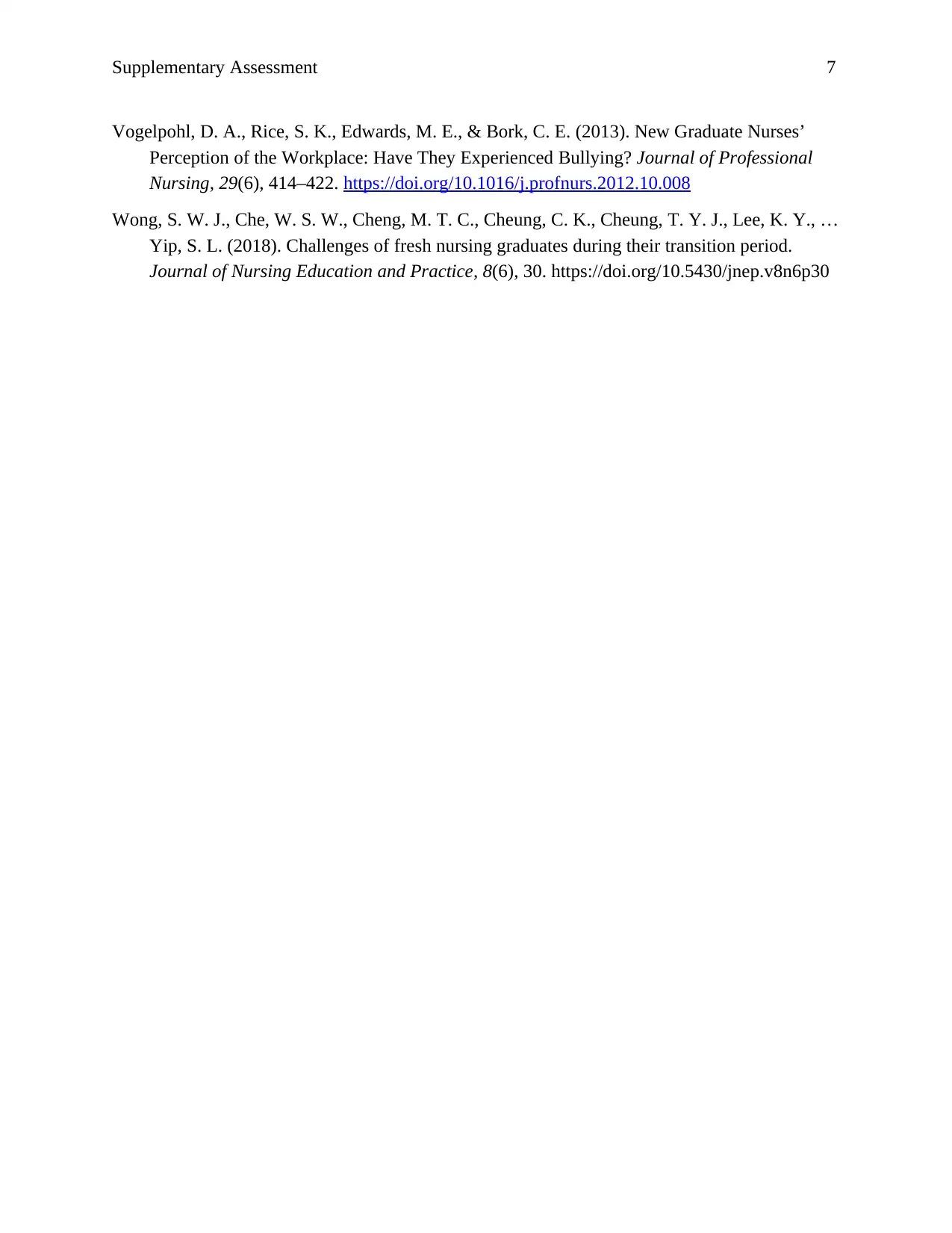
Supplementary Assessment 7
Vogelpohl, D. A., Rice, S. K., Edwards, M. E., & Bork, C. E. (2013). New Graduate Nurses’
Perception of the Workplace: Have They Experienced Bullying? Journal of Professional
Nursing, 29(6), 414–422. https://doi.org/10.1016/j.profnurs.2012.10.008
Wong, S. W. J., Che, W. S. W., Cheng, M. T. C., Cheung, C. K., Cheung, T. Y. J., Lee, K. Y., …
Yip, S. L. (2018). Challenges of fresh nursing graduates during their transition period.
Journal of Nursing Education and Practice, 8(6), 30. https://doi.org/10.5430/jnep.v8n6p30
Vogelpohl, D. A., Rice, S. K., Edwards, M. E., & Bork, C. E. (2013). New Graduate Nurses’
Perception of the Workplace: Have They Experienced Bullying? Journal of Professional
Nursing, 29(6), 414–422. https://doi.org/10.1016/j.profnurs.2012.10.008
Wong, S. W. J., Che, W. S. W., Cheng, M. T. C., Cheung, C. K., Cheung, T. Y. J., Lee, K. Y., …
Yip, S. L. (2018). Challenges of fresh nursing graduates during their transition period.
Journal of Nursing Education and Practice, 8(6), 30. https://doi.org/10.5430/jnep.v8n6p30
1 out of 7
Related Documents
Your All-in-One AI-Powered Toolkit for Academic Success.
+13062052269
info@desklib.com
Available 24*7 on WhatsApp / Email
![[object Object]](/_next/static/media/star-bottom.7253800d.svg)
Unlock your academic potential
Copyright © 2020–2026 A2Z Services. All Rights Reserved. Developed and managed by ZUCOL.





